Abdelaziz Bouteflika
Abdelaziz Bouteflika (![]()
Abdelaziz Bouteflika GColIH | |
|---|---|
عبد العزيز بوتفليقة | |
.jpg) Bouteflika in 2012 | |
| 7th President of Algeria | |
| In office 27 April 1999 – 2 April 2019 | |
| Prime Minister | Smail Hamdani Ahmed Benbitour Ali Benflis Ahmed Ouyahia Abdelaziz Belkhadem Ahmed Ouyahia Abdelmalek Sellal Youcef Yousfi (Acting) Abdelmalek Sellal Abdelmadjid Tebboune Ahmed Ouyahia Noureddine Bedoui |
| Preceded by | Liamine Zéroual |
| Succeeded by | Abdelkader Bensalah (acting) Abdelmadjid Tebboune |
| Minister of Defence | |
| In office 5 May 2003 – 2 April 2019 | |
| Preceded by | Liamine Zéroual |
| Succeeded by | Abdelmadjid Tebboune |
| Minister of Foreign Affairs | |
| In office 1963–1979 | |
| Preceded by | Mohamed Khemisti |
| Succeeded by | Mohammed Seddik Benyahia |
| President of the United Nations General Assembly | |
| In office 17 September 1974 – 15 September 1975[1] | |
| Preceded by | Leopoldo Benites |
| Succeeded by | Gaston Thorn |
| Personal details | |
| Born | 2 March 1937 Oujda, French Protectorate in Morocco |
| Political party | National Liberation Front |
| Spouse(s) | Amal Triki (m. 1990 ; d. unknown)[2] |
| Military service | |
| Allegiance | |
| Branch/service | National Liberation Army |
| Years of service | 1956–1962 |
| Battles/wars | Algerian War |
As President, he presided over the end of the bloody Algerian Civil War in 2002 when he took over the project of Liamine Zéroual (previous president), and he ended emergency rule in February 2011 amidst regional unrest. Prior to becoming president, he served as Minister of Foreign Affairs from 1963 until 1979 and as President of the United Nations General Assembly for a 1-year term from 1974.
Bouteflika resigned on 2 April 2019 after months of mass protests. With nearly 20 years in power, he was the longest-serving head of state of Algeria.[3]
Early years and War of Independence
Abdelaziz Bouteflika was born on 2 March 1937 in Oujda, French Protectorate in Morocco. He is the son of Mansouria Ghezlaoui and Ahmed Bouteflika from Tlemcen, Algeria. He has three half-sisters (Fatima, Yamina, and Aïcha), as well as four brothers (Abdelghani, Mustapha, Abderahim and Saïd) and one sister (Latifa).[4] Saïd Bouteflika, 20 years his junior, would later be appointed special counselor to his brother in 1999. Unlike Saïd, who was raised mostly in Tlemcen,[5] Abdelaziz grew up in Oujda, where his father had emigrated as a youngster.[4] The son of a zaouia sheikh, he was well-versed in the Qur'an.[6] He successively attended three schools in Oudja: Sidi Ziane, El Hoceinia, and Abdel Moumen High Schools, where he reportedly excelled academically.[4] He was also affiliated with Qadiriyya Zaouia in Oujda.[4]
In 1956, Bouteflika went to the village of Ouled Amer near Tlemcen and subsequently joined—at the age of 19—the National Liberation Army, which was a military branch of the National Liberation Front.[4] He received his militarily education at the École des Cadres in Dar El Kebdani, Morocco. In 1957–1958, he was designated a controller of Wilaya V,[4] making reports on the conditions at the Moroccan border and in west Algeria, but later became the administrative secretary of Houari Boumédiène. He became one of his closest collaborators and a core member of his Oujda Group.[7]:12[8] In 1960, he was assigned with leading the Malian Front in the Algerian south and became known with his nom de guerre of Abdelkader al-Mali, which has survived until today.[6] In 1962, at the arrival of independence, he aligned with Boumédienne and the border armies in support of Ahmed Ben Bella against the Provisional Government of the Algerian Republic.[9]
Post-independence political career
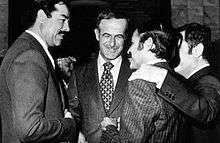
After independence in 1962, Bouteflika became deputy for Tlemcen in the Constituent Assembly and Minister for Youth and Sport in the government led by Ahmed Ben Bella; the following year, he was appointed as Minister for Foreign Affairs. He was later a prime mover in the military coup led by Houari Boumediene that overthrew Ben Bella on 19 June 1965.[10] Bouteflika continued as Minister for Foreign Affairs until the death of President Boumédienne in 1978.[9]
He has also served as president of the United Nations General Assembly in 1974 and of the seventh special session in 1975.[11] While in these posts he came in for severe criticism from the United States for what it regarded as politically partisan decisions. Algeria at this time was a leader of the Non-Aligned nations movement.[12] He discussed there with Henry Kissinger in the first talk between US and Algerian officials since the diplomatic relations between these two countries have resumed.[13]
In 1981, he was sued for having stolen Algerian embassies' money between 1965 and 1979. On 8 August 1983, Bouteflika was convicted by the Court of Financial Auditors and found guilty of having fraudulently taken 60 million dinars during his diplomatic career. In his defence Bouteflika said that he "reserved" that money to build a new building for the foreign affairs ministry, but the court judged his argument as "fallacious". In 1979, just after the death of Boumédiène, Bouteflika reimbursed 12,212,875.81 dinars out of the 70 million dinars that was deposited in a Swiss bank. Although Bouteflika was granted amnesty by President Chadli Bendjedid, his colleagues Senouci and Boudjakdji were jailed. After the amnesty, Bouteflika was given back his diplomatic passport, a villa where he used to live but did not own and all his debt was erased. He never paid back the money "he reserved for a new foreign affairs ministry's building".[14]
Succession struggle and exile
Following Boumédienne's unexpected death in 1978, Bouteflika was seen as one of the two main candidates to succeed the powerful president. Bouteflika was thought to represent the party's "right wing" that was more open to economic reform and rapprochement with the West. Colonel Mohamed Salah Yahiaoui represented the "boumédiennist" left wing.[15] In the end, the military opted for a compromise candidate, the senior army colonel Chadli Bendjedid. Bouteflika was reassigned the role of Minister of State, but successively lost power as Bendjedid's policies of "de-Boumédiennisation" marginalised the old guard.[9]
After six years abroad, the army brought him back to the Central Committee of the FLN in 1989, after the country had entered a troubled period of unrest and disorganised attempts at reform, with power-struggles between Bendjedid and a group of army generals paralysing decision-making. In 1992, the reform process ended abruptly when the army took power and scrapped elections that were about to bring the fundamentalist Islamic Salvation Front to power. This triggered a civil war that would last throughout the 1990s. During this period, Bouteflika stayed on the sidelines, with little presence in the media and no political role. In January 1994, Bouteflika is said to have refused the Army's proposal to succeed the assassinated president, Mohamed Boudiaf; he claimed later that this was because the army would not grant him full control over the armed forces. Instead, General Liamine Zéroual became President.[9]
First term as President, 1999–2004
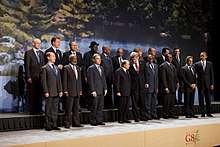
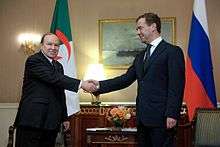
In 1999, Zéroual unexpectedly stepped down and announced early elections. The reasons behind his decision remain unclear, but it is widely claimed that his pro-reconciliation policies towards the Islamist insurgency had incurred the wrath of a hard-line faction in the armed forces; or that some other disagreement with the military, which still dominated politics, lay behind the schism. Bouteflika ran for president as an independent candidate, supported by the military. He was elected with 74% of the votes, according to the official count. All other candidates withdrew from the election immediately prior to the vote, citing fraud concerns. Bouteflika subsequently organised a referendum on his policies to restore peace and security to Algeria (involving amnesties for Islamist guerrillas) and to test his support among his countrymen after the contested election. He won with 81% of the vote, but this figure was also disputed by opponents.[9]
Foreign policy
Bouteflika was also active on the international scene, presiding over what many have characterised as Algeria's return to international affairs, after almost a decade of international isolation. He presided over the African Union in 2000, secured the Algiers Peace Treaty between Eritrea and Ethiopia, and supported peace efforts in the African Great Lakes region. He also secured a friendship treaty with nearby Spain in 2002, and welcomed president Chirac of France on a state visit to Algiers in 2003. This was intended as a prelude to the signature of a friendship treaty.
Algeria has been particularly active in African relations, and in mending ties with the West, as well as trying to some extent to resurrect its role in the declining non-Aligned movement. However, it has played a more limited role in Arab politics, its other traditional sphere of interest. Relations with the Kingdom of Morocco remained quite tense, with diplomatic clashes on the issue of the Western Sahara, despite some expectations of a thaw in 1999, which was also the year of King Mohamed VI's accession to the throne in Morocco.
Second term as President, 2004–09
On 8 April 2004, he was re-elected by an unexpectedly high 85% of the vote in an election that was accepted by Western observers as a free and fair election. This was contested by his rival and former Chief of Staff Ali Benflis. Several newspapers alleged that the election had not been fair.[16] Frustration was expressed over extensive state control over the broadcast media. The electoral victory was widely seen as a confirmation of Bouteflika's strengthening control over the state, cemented through forcing General Mohammed Lamari to resign as his chief of staff and replacing him "with Ahmed Salah Gaid, his close friend and ally."[7]
Only 17% of people in Kabylie voted in 2004,[16] which represented a significant increase over the violence-ridden legislative elections of 2002.[17] Country-wide, the registered turnout rate was 59%.[16]
Reconciliation plan
During the first year of his second term, Bouteflika held a referendum on his "Charter for Peace and National Reconciliation", inspired by the 1995 "Sant'Egidio Platform" document. The law born of the referendum showed that one of Bouteflika's goals in promoting this blanket amnesty plan was to help Algeria recover its image internationally and to guarantee immunity to institutional actors.[18]
Economic policies
The first year of Bouteflika's second term also featured a new five-year plan, much larger this time drafted. The Complementary Plan for Economic Growth Support (PCSC: Plan Complementaire de la Croissance Économique) aims for the construction of 1 million housing units, the creation of 2 million jobs, the completion of the East-West highway, the completion of the Algiers subway project, the delivery of the new Algiers airport, and other similar large scale infrastructure projects. The PCSC totals $60 billion of spending over the five-year period. Bouteflika also aims to bring down the external debt from $21 billion to $12 billion in the same time. He has also obtained from Parliament the reform of the law governing the oil and gas industries, despite initial opposition from the workers unions. However, Bouteflika has since stepped back from this position, supporting amendments to the hydrocarbon law in 2006, which propose watering down some of the clauses of the 2005 legislation relating to the role of Sonatrach, the state owned oil & gas company, in new developments. It also proposes new provisions enabling the country to benefit from windfall taxes on foreign investors in times of high prices. Bouteflika has also put up for sale 1300 public sector companies, and has already achieved privatisation of about 150 of them, mainly in the tourism, food processing, cement, construction material and chemical industries.
Foreign policy
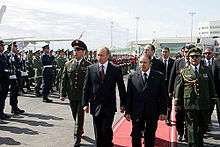
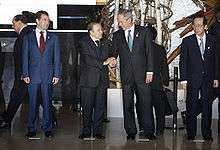
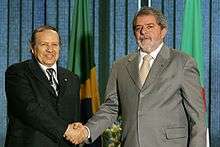
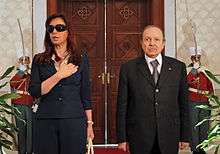
During Bouteflika's second term he was sharply critical of the law—passed after the 2005 French riots—ordering French history school books to teach that French colonisation had positive effects abroad, especially in North Africa. The diplomatic crisis which ensued delayed the signing of a friendship treaty between the two countries.[19]
Ties to Russia were strengthened and Russia agreed to forgive debts if Algeria began buying arms and gave Russian gas companies (Gazprom, Itera, and Lukoil access to joint fossil-fuel ventures in Algeria.[20]
In 2004 Bouteflika organised the Arab League Summit and became President of the Arab League for one year. His calls for reform of the League did not gain sufficient support to pass in during the Algiers summit however.
At the March 2005 meeting of Arab leaders, held in Algiers, Bouteflika spoke out strongly against Israel, "The Israelis' continuous killing and refusal of a comprehensive and lasting peace, which the Arab world is calling for, requires from us to fully support the Palestinian people." Despite criticism from the west, specifically the US, Bouteflika insisted that Arab nations would reform at their own pace.[21]
Bouteflika remains active in foreign affairs, especially within the region and many of his foreign affairs policies and decisions are characterized by a “principle of non-interference” in other countries affairs. In March 2016, the foreign ministers of the Arab league voted to declare Hezbollah a terrorist organization, Bouteflika voted with Lebanon, Syria and Iraq to reject the motion.[22]
In sub-Saharan Africa, a major concern of Bouteflika's Algeria has been on-and-off Tuareg rebellions in northern Mali. Algeria has asserted itself forcefully as mediator in the conflict, perhaps underlining its growing regional influence. Algerian interest is driven by its extensive interests in the region: smuggling routes as well as legal economic activity crosses these virtually unguarded borderlands, and refugees from the conflict have entered southern Algeria to mix with the Tuareg populations there. Also, the area is known as a hideout of a southern branch of AQIM, further heightening Algeria's interest in the area. Compromise peace agreements were reached in 2007 and 2008, both mediated by Algiers. The related Touareg revolt in neighbouring Niger has not seen the same Algerian involvement, even if the anti-government MNJ movement has on at least one occasion called for Algerian mediation similar to in Mali. Algeria's involvement in Africa has otherwise been concerned with supporting the African Union, and been marked by a rapidly strengthening coordination with South Africa, which, among other things, has emerged as Algeria's main ally on the Western Sahara issue.
All in all, Algeria's foreign policy under Bouteflika remains hinged on same axis as under earlier governments, emphasizing South–South ties, especially with growing Third World powers (China, South Africa, Brazil, etc.) and guarding the country's independence in decision-making vis-a-vis the West, although simultaneously striving for good trade relations and non-confrontational political relations with the EU and USA.
President of Vietnam Nguyễn Minh Triết, on 16 July 2009, met with Bouteflika on the sidelines of the 15th Non-Aligned Movement (NAM) summit in Egypt. President Triet and Bouteflika agreed that the two countries still have great potential for development of political and trade relations. Triet thanked the Algerian government for creating favourable conditions for the Vietnam Oil and Gas Group to invest in oil and gas exploration and exploitation in Algeria.[23]
Hospitalization in 2005 and later
Bouteflika was admitted to a hospital in France on 26 November 2005, reportedly suffering from a gastric ulcer hemorrhage, and discharged three weeks later.[24] However, the length of time for which Bouteflika remained virtually incommunicado led to rumours that he was critically ill with stomach cancer.[25] He checked into the hospital again in April 2006.[26]
A leaked diplomatic cable revealed that, by the end of 2008, Bouteflika had developed stomach cancer.[27]
In spring and summer 2013, Bouteflika stayed nearly four months in a hospital in Paris dealing with health problems.[28]
Bouteflika was admitted to a clinic at Grenoble in France in November 2014.[29]
As of early 2016, Bouteflika had not been seen in public for more than two years, and several of his close associates had not seen him for more than one year. It was alleged that he "can hardly speak and is said to communicate by letter with his ministers".[30]
In November 2016, he was hospitalized in France for medical checks.[31]
Constitutional amendment for a third term
Bouteflika appointed a new Prime Minister, Abdelaziz Belkhadem, in 2006. Belkhadem then announced plans that violate the Algerian Constitution to allow the President to run for office indefinitely and increase his powers.[32] This was widely regarded as aimed to let Bouteflika run for president a third term. A referendum was originally scheduled for 2007, but cancelled for reasons never explained. In 2008, Belkhadem was again shifted out of the premiership and his predecessor Ahmed Ouyahia brought in, having also come out in favor of the constitutional amendment.
The Council of Ministers announced on 3 November 2008 that the planned constitutional revision proposal would remove the presidential term limit previously included in Article 74.[33] The People's National Assembly endorsed the removal of the term limit on 12 November 2008; only the Rally for Culture and Democracy (RCD) voted against its removal.[34]
Third term as President, 2009–14
Following the constitutional amendment allowing him to run for a third term, on 12 February 2009, Bouteflika announced his independent candidacy in the 2009 presidential election.[35] On 10 April 2009, it was announced that Bouteflika had won the election with 90.24% of the vote, on a turnout of 74%,[36] thereby obtaining a new five-year term. Several opposition parties had boycotted the election, with the opposition Socialist Forces Front citing a "tsunami of massive fraud."[36]
2010–12 Algerian protests
In 2010, journalists gathered to demonstrate for press freedom and against Bouteflika's self-appointed role as editor-in-chief of Algeria's state television station.[37] In February 2011, the government rescinded the state of emergency that had been in place since 1992 but still banned all protest gatherings and demonstrations. However, in April 2011, over 2,000 protesters defied an official ban and took to the streets of Algiers, clashing with police forces. Protesters noted that they were inspired by the recent Egyptian revolution, and that Algeria was a police state and "corrupt to the bone".[38]
2013 stroke
In 2013, Bouteflika suffered a debilitating stroke.[39] A journalist, Hichem Aboud, was pursued for "threatening national security, terrtorial integrity, and normal management of the Republic's institutions" and his newspapers were censored, because he wrote that the President had returned from Val-de-Grâce in a "comatose state" and had characterized Saïd Bouteflika as the puppet-master running the administration.[40][41]
Fourth term as President, 2014–2019
Following yet another constitutional amendment, allowing him to run for a fourth term, Bouteflika announced that he would. He met the electoral law requiring a candidate to collect over 60,000 signatures from supporters in 25 provinces.[42] He very seldom appeared in person on the campaign trail. On 18 April 2014, he was re-elected with 81% of the vote, while Benflis was second placed with 12.18%.[43] The turnout was 51.7%, down from the 75% turnout in 2009.[44] Several opposition parties boycotted the election again, resulting in allegations of fraud.
Bouteflika cabled his congratulations to freshly-reelected Bashar al-Assad on 19 April 2014.[45]
On 20 February 2017, the German Chancellor Angela Merkel canceled her trip to Algeria an hour before takeoff, reportedly because Bouteflika was suffering from severe bronchitis.[46]
In June 2017, Bouteflika made a rare, and brief, appearance on Algerian state television presiding over a cabinet meeting with his new government. In a written statement, he ordered the government to reduce imports, curb spending, and be wary of foreign debt. He called for banking sector reform and more investment in renewable energy and "unconventional fossil hydrocarbons."[47] Bouteflika is wheelchair-bound and has not given a speech in public since 2014 due to aphasia following his stroke.[48]
Candidacy for fifth term, protests and resignation
On 10 February 2019, a press release signed by long-ailing Bouteflika announcing he would seek a fifth consecutive term provoked widespread discontent. Youth protesters demanded his picture be removed from city halls in Kenchela and Annaba in the days before the national demonstrations on 22 February, organized via social media.[39] Those in Algiers, where street protests are illegal, were the biggest in nearly 18 years. Protestors ripped down a giant poster of Bouteflika from the landmark Algiers central post office.[49][50]
On 11 March 2019, after sustained protests, Bouteflika announced that he would not seek a new term.[51] However, his withdrawal from the elections was not enough to end the protests. On Sunday, 31 March 2019, Bouteflika along with the Prime Minister Noureddine Bedoui who had taken office 20 days earlier, formed a 27-member cabinet with only 6 of the appointees being retained from the outgoing president administration. The next day, Bouteflika announced that he would resign by 28 April 2019.[52] Acceding to demands by the army chief of staff, he ultimately resigned a day later, on 2 April 2019.[53]
Honours
_-_ribbon_bar.gif)



_1class_BAR.svg.png)





_GC.svg.png)


_-_ribbon_bar.gif)

Notes
- Nations, United; Nations, United. "UN General Assembly - President of the 62nd Session - Abdelaziz Bouteflika (Algeria)". www.un.org. Retrieved 1 February 2020.
- "Algérie : Bouteflika et les femmes – JeuneAfrique.com". 3 March 2015. Retrieved 11 April 2018.
- "Introduction ::Algeria". Archived from the original on 30 September 2012.
- Dalila Belkheir; Khadidja B. "Bouteflika : Maquisard, Ministre et Président de la république". Ennahar Online. Archived from the original on 6 October 2011. Retrieved 27 August 2011.
- Farid Alilat (5 August 2013). "Saïd Bouteflika: Mister mystère". Jeune Afrique (in French). Retrieved 7 April 2019.
- "Abdelaziz Bouteflika". Fanack.com. Retrieved 9 August 2016.
- Tlemçani, Rachid (2008). "Algeria Under Bouteflika: Civil Strife and National Reconciliation" (PDF). Carnegie Papers. 7.
- "Houari Boumediene". GlobalSecurity.org.
- "Abdelaziz Bouteflika, president of Algeria Biography". Encyclopaedia Britannica. Retrieved 2 April 2019.
- Gleijeses, Piero (1996). "Cuba's First Venture in Africa: Algeria, 1961–1965". Journal of Latin American Studies. 28 (1): 159–195. doi:10.1017/s0022216x00012670. JSTOR 157991.
- "UN General Assembly – President of the 62nd Session – Abdelaziz Bouteflika (Algeria)". www.un.org. Retrieved 14 May 2017.
- SINGHAM, A. W. (1976). "The Fifth Summit Conference of the Non-Aligned Movement". The Black Scholar. 8 (3): 2–9. doi:10.1080/00064246.1976.11413869. ISSN 0006-4246. JSTOR 41066077.
- Montgomery, Paul L. (22 December 1974). "Kissinger Meets Waldheim and Bouteflika at the U.N." The New York Times. Retrieved 14 May 2017.
- El Moudjahid newspaper, 9 August 1983
- "ALGERIA: New Leader". Time. 12 February 1979. Retrieved 11 April 2018 – via www.time.com.
- Holm, Ulla (2005). "Algeria: President Bouteflika's Second Term". Mediterranean Politics. 10 (1): 117–122. doi:10.1080/1362939042000338881.
- "Protesters boycott Algerian Polls". BBC. 30 May 2002. Retrieved 4 April 2019.
- "L'Algérie entre amnistie et amnésie". Human Rights Watch. 19 April 2006. Retrieved 4 April 2019.
La loi prévoit jusqu'à cinq ans de prison pour toute déclaration ou activité en rapport avec la «tragédie nationale» qui pourrait «porter atteinte» aux institutions nationales, à «l'honorabilité de ses agents» ou à «l'image de l'Algérie sur le plan international».
- "Le président algérien relance la polémique avec Paris sur le rôle de la France durant la colonisation". Le Monde (in French). 29 June 2005. Retrieved 6 April 2019 – via AFP.
- "Algeria - Air Force - Modernization". GlobalSecurity.org. Retrieved 6 April 2019.
- "Middle East: Arab Leaders Resist U.S. Pressure At Algiers Summit". RadioFreeEurope/RadioLiberty. Retrieved 25 June 2017.
- "Algeria's Hezbollah stance 'reflects view on resistance, not terrorism'". Middle East Eye. Retrieved 25 June 2017.
- VN President meets Algerian leader in Egypt Archived 26 July 2009 at the Wayback Machine
- Aomar Ouali, "Bouteflika 'completely healed'" Archived 6 May 2006 at the Wayback Machine, Associated Press (news24.com), 18 December 2005.
- middle-east-online.com Archived 28 August 2006 at the Wayback Machine, no author, date 15 December 2005
- "Algeria leader in French hospital", BBC News, 20 April 2006.
- "Cable 07ALGIERS1806, AN AILING AND FRAGILE ALGERIAN REGIME DRIFTS INTO 2008". US State Department. Archived from the original on 11 February 2011. Retrieved 13 February 2011.
- "Abdelaziz Bouteflika back in Algeria". lepoint.fr. 16 July 2013. Retrieved 16 July 2013.
- "Bouteflika hospitalisé à Grenoble. Dauphiné libéré, 14 November 2014
- "Algeria: Who is in charge?". The Economist. 6 February 2016. Retrieved 6 February 2016.
- "Algerian president in France for medical checks". eNCA. Retrieved 1 February 2020.
- iol.co.za, by Hassane Meftahi, 26 May 2006; and liberation.fr (in French)
- "Algérie: vers la suppression de la limitation des mandats présidentiels" Archived 6 November 2008 at the Wayback Machine, AFP, 3 November 2008 (in French).
- "Algerian opposition pulls out of 'pathetic' presidential vote", AFP, 15 January 2009.
- "Bouteflika seeks third term in office", Reuters (IOL), 12 February 2009.
- Bouteflika wins third term as Algerian president – reuters, 10 April 2009
- "Algeria: Stop Suppressing Protests". Human Rights Watch. 3 May 2010. Retrieved 25 June 2017.
- "Algeria protesters push for change". www.aljazeera.com. Retrieved 25 June 2017.
- Amir Akef; Charlotte Bozonnet; Madjid Zerrouky (23 February 2019). "Algérie:révolte inédite contre le pouvoir". Le Monde (in French). Retrieved 10 March 2019.
- Alain Jordain (19 September 2013). ""Saïd Bouteflika veut me faire taire. Il n'y arrivera pas"". Tribune de Genève (in French).
On m’accuse d’avoir porté atteinte à la sécurité nationale, à l’intégrité territoriale et à la gestion habituelle des institutions de la République.
- Benjamin Roger; Farid Alilat. "Algérie : quand Saïd Bouteflika orchestre le silence présidentiel". Jeune Afrique (in French). Retrieved 7 April 2019.
- "Algeria's Bouteflika to run for re-election". www.aljazeera.com. Retrieved 25 June 2017.
- "Bouteflika wins 4th term as Algerian president". Al Arabiya. 18 April 2014. Retrieved 19 April 2014.
- "Algeria's ailing president wins fourth term". Al Jazeera. 18 April 2014. Retrieved 19 April 2014.
- "syriatimes.sy – President Assad Receives Congratulations from President Bouteflika on Winning Elections". syriatimes.sy. Retrieved 20 April 2015.
- "Germany: Chancellor Cancels Visit To Algeria". Stratfor. Retrieved 11 April 2018.
- "Algeria's Bouteflika urges spending cuts, warns on foreign debt". africaTech. 15 June 2017.
- Akram Belkaïd; Makdar Benchiba (April 2009). "En Algérie, les décideurs de l'ombre". Le Monde Diplomatique (in French). pp. 1, 16–17. Retrieved 5 April 2019.
- Jawad, Rana (6 March 2019). "The president who doesn't speak". BBC. Retrieved 10 March 2019.
- "Algeria's Bouteflika warns of 'chaos'". BBC. 7 March 2019. Retrieved 10 March 2019.
- Chikhi, Lamine; Hamid, Ahmed (11 March 2019). "Beset by protests, Algeria's Bouteflika will not seek new term". Reuters. Retrieved 11 March 2019.
- "Algeria's Bouteflika will resign by April 28: State media". Al Jazeera. 1 April 2019. Retrieved 1 April 2019.
- Ahmed, Hamid (4 April 2019). "Algerian president Bouteflika resigns: state news agency". Reuters. Retrieved 2 April 2019.
- "G1 > Mundo – NOTÍCIAS – Lula e Sarkozy reforçarão associação militar entre França e Brasil". Retrieved 30 December 2016.
- "Cidadãos Estrangeiros Agraciados com Ordens Portuguesas". Página Oficial das Ordens Honoríficas Portuguesas. Retrieved 1 August 2017.
References
- Official biography (in French)
Further reading
- Aussaresses, Paul (2010). The Battle of the Casbah: Terrorism and Counter-Terrorism in Algeria, 1955–1957. New York: Enigma Books. ISBN 978-1-929631-30-8.
- Holm, Ulla (2005). "Algeria: President Bouteflika's Second Term". Mediterranean Politics. 10 (1): 117–122. doi:10.1080/1362939042000338881.
- Tlemçani, Rachid (2008). "Algeria Under Bouteflika: Civil Strife and National Reconciliation" (PDF). Carnegie Papers. 7.
External links
- (in French) Official site
| Wikimedia Commons has media related to Abdelaziz Bouteflika. |
| Diplomatic posts | ||
|---|---|---|
| Preceded by Leopoldo Benites |
President of the United Nations General Assembly 1974–1975 |
Succeeded by Gaston Thorn |
| Preceded by Blaise Compaoré |
Chairperson of the Organisation of African Unity 1999–2000 |
Succeeded by Gnassingbé Eyadéma |
| Political offices | ||
| Preceded by Liamine Zéroual |
President of Algeria 1999–2019 |
Succeeded by Abdelkader Bensalah Acting Head of State |